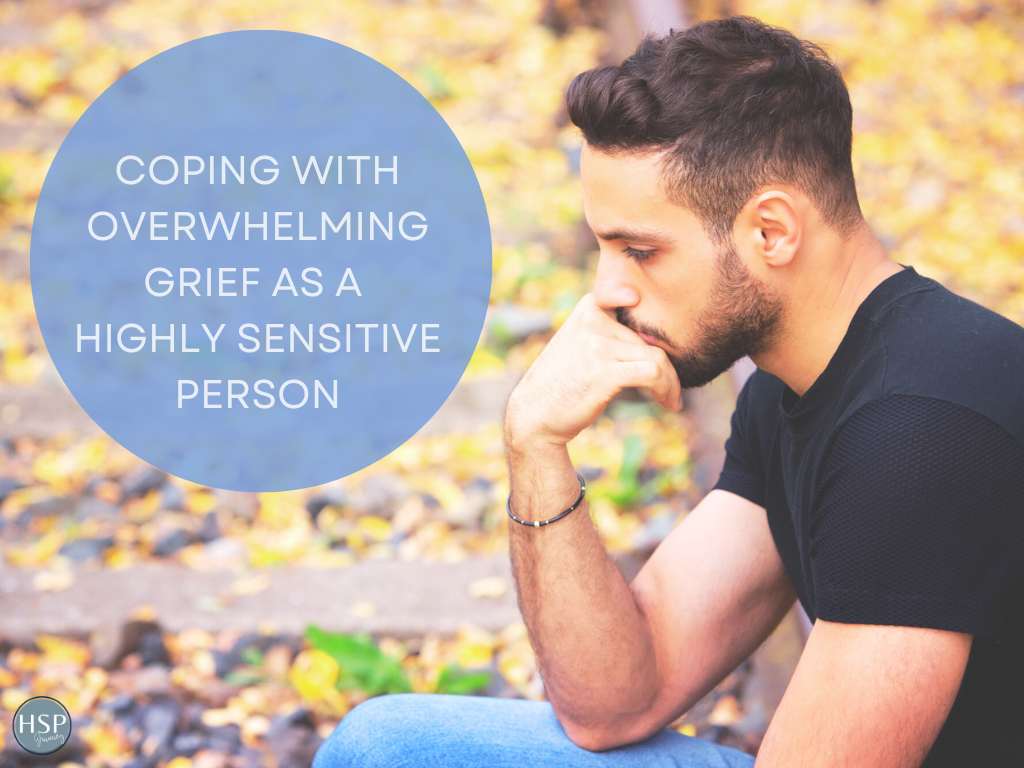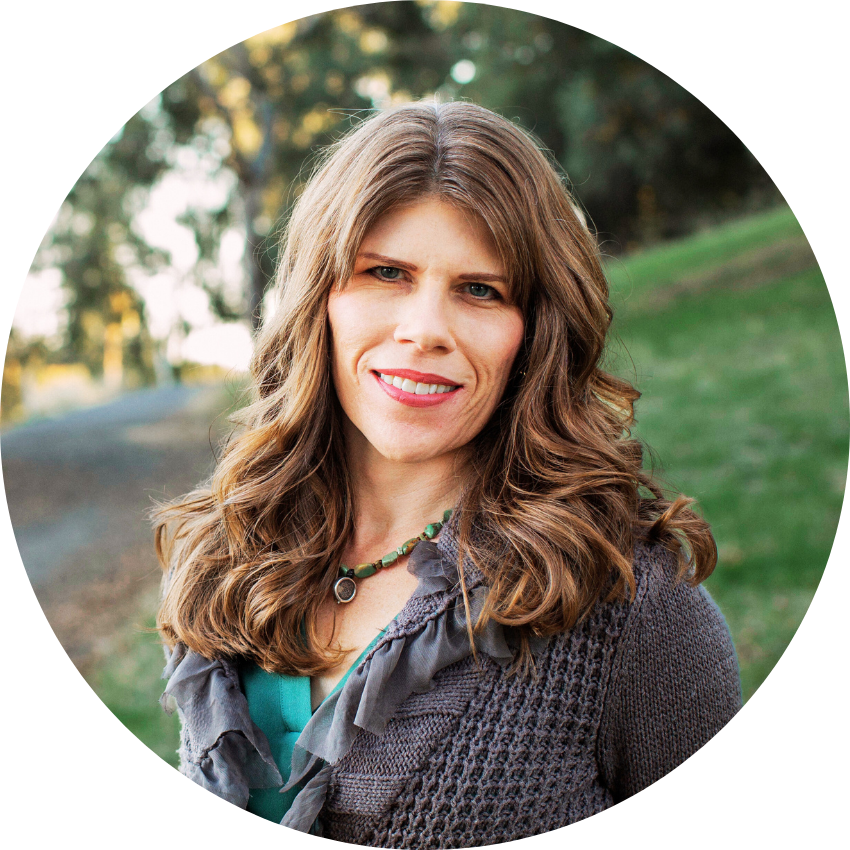As a highly sensitive person (HSP) who works with HSP clients, I think it’s particularly important to acknowledge what role grief plays in our lives and find ways to manage its intensity so that we can eventually learn from it. Coping with overwhelming grief as a highly sensitive person is no easy task.
Over the years, I’ve noticed that I’m drawn to grief, seeing it as universal and, as such, something to befriend, understand, and become comfortable interacting with. Grief is never easy or simple, a lesson I learned young and driven home to me by the death of my father when I was fourteen. However, I have also learned many lessons from grief that make my life richer.

Table of Contents
What are Loss, Grief, and Mourning?
Let’s begin by sorting out the vocabulary of this area, since so many of us have been encouraged to not talk about loss, grief, and mourning. First off, a loss is any trigger to feelings of grief. It includes things that we commonly recognize, such as the death of a loved one, but it also includes things like the death of a pet, losing a job, changing or leaving school, getting divorced or separated, or the endings of other relationships. Any transitions where an ending brings up strong feelings can trigger feelings of loss.
Grief is your internal experience of loss. It encompasses all of the emotions, thoughts, physical sensations, and shifts in how we relate to other people and the world around us. It even encompasses our disrupted sense of time.
Mourning, on the other hand, is the externalized expression of grief, like funerals, wakes, and other rituals that grieving people observe. Mourning can be practiced individually or in a group setting. It includes practices that are highly personal, as well as cultural and religiously structured observances.
Mourning tends to be connected to certain time periods in the immediate wake of a loss or on anniversaries of the loss. Grief, however, is not bound to any schedule. In fact, most grief counselors and researchers think that grief stays with us for life, although the forms it takes evolve as we continue to grow.
While many of the losses described above are widely recognized as sources of grief, other losses that are not as widely acknowledged: pregnancy losses, being incarcerated or having a loved one be incarcerated, death of someone with whom we had a fractured relationship, ending of a business, and countless other that are not validated or publicly mourned. This so-called hidden or disenfranchised grief can be particularly difficult to manage, so I’ve created a resource you can download to help specifically with grieving these losses.
The Challenges of the Stages of Grief Model
You might be familiar with the stages of grief model, which posits that grieving people go through denial, anger, bargaining, depression, and acceptance. There is a tremendous amount that has been written for and against this model, much of it the kind of academic bickering that is not helpful to people who are grieving.
I think it is helpful to know that this model is just one theory of how people move through grief. It came into existence at a time where people barely acknowledged grief beyond the mourning phase. As such, it was transformative in getting people to recognize and talk about some of the common ways that people experience grief. It also gave hope to people in the early period after a loss that they would not continue to feel as much intense emotion, but would eventually move toward acceptance, or learning to live with loss.
The stages model was never intended to be taken too literally, as if one stage fully resolves before another starts, each happening in a perfect line. The reality of grief for most people is that grief is a mixture of emotions, likely including all five of these and many, many more. Much of the time, people are feeling multiple emotions; sometimes, we may be so numb that it’s hard to identify our underlying emotional state. This is particularly true when, as HSPs, we feel overwhelmed and overstimulated by the grief experience.
Please do not let anyone tell you that you are grieving wrong because your grief doesn’t look like this stage model. And don’t do that to yourself, either. Whatever you experience, your expression and process of grief is right for you and the uniqueness of your loss.
“We Grieve How We Live”
My formal education in grief counseling began over two decades ago at a day-long training by grief expert David Kessler. One thing he said that has stuck with me all these years is that “we grieve how we live.” I remember that landing for me with tremendous weight. Who we are as people in our “everyday” lives sets the tone for how we grieve. While it may seem obvious on the one hand, it also explains the tremendous variety of grief responses we see. And ideally, keeping this in mind can help us be compassionate and understanding with ourselves and with other grieving people. We’re all grieving with the tools, habits, temperaments, and personalities that we bring to every other aspect of our life.
That means that as highly sensitive people, we should expect our grief process to be emotionally heightened. HSPs that I’ve worked with and known tend to feel the same range of emotions as other grieving people, but with greater intensity. Sometimes those feelings may seem to last longer for HSPs, although I wonder if other people have simply given in to cultural conditioning to “move on” in ways that HSPs cannot do because of how inauthentic that feels. Many HSPs also ruminate deeply about their losses, likely due to the fact that we think more deeply about everything than our non-HSP peers.
One misconception is that HSPs are going to be more publicly demonstrative of their emotions, whether in general or while grieving. This is not necessarily the case and depends on many complex factors. As an example, while I’m someone who cries quite easily in private and in front of other people, I rarely cry more than a few tears while I’m at a funeral or wake. The environment is so overstimulating, the impact of other people’s emotions so intense for someone with my ability to empathize, that I become somewhat closed off from my own tears. But I guarantee that I’ll cry in the car to and from, as well as when I gather in more intimate settings with friends and family.
Again, there’s no right way to express your grief, so do whatever fits for you.

Looking for an HSP-Trained coach to help you align your life with your priorities?
Through my Highly Sensitive Person (HSP) certification with the Nickerson Institute, as well as being an HSP, I offer HSP coaching to develop specific goals around your HSP needs. We HSPs frequently deal with anxiety and overstimulated nervous systems that prevent us from achieving peace and attaining our life goals. HSP coaching with me includes a detailed review of your sensitivities and a mutually-desired plan for growth and management of this superpower to shift negativity and begin seeing yourself as the hero of your own story. [Coaching packages start at $150 per month.]
Coping with Overwhelming Grief as a Highly Sensitive Person
There are three things I recommend HSPs do help themselves through grief. These things can be done in any order, and while you might not need to do all three, it’s helpful to consider whether any of these responses can help you as you go through your journey with grief.
Strategize
Take an honest, objective look at what you need as you grieve. Decide what is essential for you to have at this moment and think about how you can bring that into your life. Create a plan for what will help you get through this time. There are a list of some grief supports at the end of this article, but don’t forget to reach out to your personal supports to fill in the gaps.
Simplify
Find ways to simplify as much as possible in your life. Take shortcuts. Eating is mandatory; home-cooked meals made with ingredients from three different markets is not. Figure out an acceptable alternative and embrace it as a temporary substitute.
Give yourself permission to set tasks aside until you feel less overwhelmed. Or delegate them. Pause the spring cleaning you’d normally do or bow out of a social obligation that is going to further overwhelm you. Focus on making your life as simple as possible until things stop swirling around you.
Surrender
You may not like acknowledging your grief or feelings of overwhelm. It might feel uncomfortable to reach out for help or pare back your activities. You may be in a hurry to put this phase behind you and get back to what’s “normal” for you. But the fact is, you are in an overwhelming period. Acknowledge it. Name it. And accept it as reality.
When you are grieving, there is no energy to spare to fight against whether you “should” feel a certain way. You DO feel that way. Surrender to that reality. Seek support for that process from a therapist, spiritual or religious advisor, or other people who have walked through grief.

A Lesson of Hope for Coping with Overwhelming Grief
Part of why I find it meaningful to journey with people who are grieving is that I know that there is always hope for the future. Yes, life after loss can be brutal. We will never be the same as we were before. But we can continue to love the person or thing we lost and have a relationship with them.
Never assume that you are too sensitive to do this work. But do give yourself permission to go at your own pace and do it your own way. Our lives grow around our loss, making space for change and new growth. Our loss is not diminished, but rather is woven into the tapestry of who we continue to become. That is a source of hope and beauty to me. It sustains me in my own grief and as I walk with the grieving.
Resources for Grieving People
Therapists, coaches, and peer-to-peer support from individuals who have trained under grief expert David Kessler
VA resources for veterans and families
Sesame Workshop for grieving children and the adults who love them
Megan Devine, author of It’s OK that You’re Not OK
Paul Denniston, grief yoga
Be sensitive, be free
*This post contains affiliate links and I will be compensated if you make a purchase after clicking on my links*





[…] embrace your powerful perceptiveness and continue being the sensitive and strong person you are. Your extraordinary attention to detail and ability to connect with your surroundings and […]